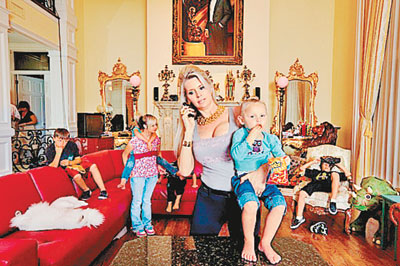|

F. Scott Fitzgerald wrote that “the rich are very different from you and me.” Director Lauren Greenfield, in her documentary* “The Queen of Versailles,” tries to prove that the rich aren’t that different — even if her subjects sometimes show how different they really are.
David Siegel is CEO of Westgate Resorts, a massive time-share* firm that runs locations all over the United States. Jackie is David’s 30-years-younger “trophy wife*.”
As the movie begins, the Siegels are enjoying a lavish* life. David is just opening what he hopes will be the pride of his business, a huge time-share resort in Las Vegas. And they are in the process of building the largest house in America, a 8,361-square-meter mansion modeled after Versailles, the iconic castle in France.
The story changes as the housing bubble* pops. Suddenly, Westgate’s customers can no longer take out subprime loans* and without those loans, David’s dreams and his empire may collapse*.
From here, Greenfield focuses much of her film on Jackie’s trying to “economize*” for herself and their eight children. The results — like a trip to Walmart in which Jackie buys unnecessary Christmas gifts — are pathetic* and comical*.
But there’s more going on in Greenfield’s film. She captures moments of real-life drama, such as when some of the Siegels’ employees talk about how the economy has hit them hard.
“The Queen of Versailles” also succeeds in proving that the Siegels are closer to regular people than most of America’s billionaires. David actually built his business himself, and he risks losing it if his Vegas deal goes wrong. Most of America’s superrich inherited* their billions and keep them safe in offshore banks while gambling* with other people’s money.
(SD-Agencies)
|

